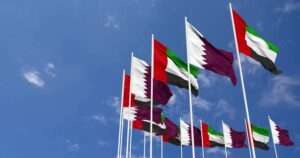By Zahack Tanvir
In today’s volatile media landscape, telling bitter truths about Palestine, Israel, and the Muslim Brotherhood (Ikhwan) often leads to accusations of hypocrisy. But truth does not lose its essence just because it is uncomfortable. As the late Saudi scholar Sheikh Rabi bin Hadi al-Madkhali once remarked, “There are some morals even among the Jews. And what have the Ikhwan brought to the Muslims except chaos?” These words may appear incendiary to some, but they demand contemplation, especially in light of unfolding geopolitical realities.
Sheikh Rabi, who passed away in Madinah on Thursday morning, was among the few voices who consistently exposed the ideological double standards within the Islamic world. His criticisms of Syed Qutb and Hassan al-Banna, founders of the Muslim Brotherhood, were rooted in theological depth and geopolitical clarity.
On his death, the Libyan National Army sent condolences. His views should be studied in the context of the decades-long turmoil that has engulfed the Middle East, often in the name of political Islam.
Let us begin with an observation few wish to acknowledge: the issue of Palestine has been festering for over 75 years, with no realistic resolution in sight.
In contrast, Syria’s civil war, devastating as it was, has shown signs of political closure. Bashar Al-Assad escaped to Moscow, Ahmed Al-Sharaa regained the ground, normalized ties with neighboring states and negotiated strategic relief, including the lifting of U.S. sanctions. Syrians along with their Saudi-brethren thanks U.S. President Donald Trump for his strategic masterstroke.
Palestine, on the other hand, remains a magnet for global attention, funding, and polemics—yet very little real progress.
3.Land, Loyalty, and Legacies.
One of the most uncomfortable truths is the historical sale of land by Arab landowners to Jewish buyers during the British Mandate era. The 1937 British Peel Commission stated, “Not all the land acquired by Jews was sold by poor fellahin. Much was sold by great landlords… in some cases resident in Syria or Lebanon.”
The famous Sursock family of Lebanon, for instance, sold over 80,000 acres in the Jezreel Valley to the Jewish National Fund. According to historian Rashid Khalidi, “Zionist land acquisition was legally conducted, and many of the sellers were absentee landlords.”
This raises a moral and political dilemma. When Palestinians themselves, or at least their elites, engage in land sales, can blame be solely directed at Israel? This is not a justification of the occupation, but an attempt to locate responsibility across the board.
4.Arab Nations and the Cost of Solidarity.
Saudi Arabia, Kuwait, and Jordan have historically provided extensive support to the Palestinian cause—politically, financially, and diplomatically. And yet, they have often received betrayal in return.
In 1990, during Saddam Hussein’s invasion of Kuwait, Yasser Arafat and the PLO openly backed the Iraqi regime. This led to the mass expulsion of nearly 200,000 Palestinians from Kuwait after the war. The former Palestinian ambassador to Kuwait, Salah Abdel-Shafi, later admitted in an interview: “We made a historic mistake by aligning with Saddam.”
In Jordan, the 1970 “Black September” conflict erupted after PLO factions tried to overthrow King Hussein’s monarchy and create a “state within a state.” Over 3,000 people were killed before the Jordanian army expelled the Palestinian militants. King Hussein described the events as a near existential threat to Jordan’s sovereignty.
In Lebanon, the PLO became a destabilizing force in the 1970s and 80s. It established bases, challenged state authority, and was a major actor in the Lebanese Civil War. Historian Robert Fisk documented how Lebanese civilians paid the price for the armed struggle waged by the PLO against Israel from Lebanese soil.
5.Gaza, 2005: Withdrawal and What Followed.
In 2005, Israel unilaterally withdrew from Gaza, evacuating all settlements. But instead of taking this as a stepping stone for peace or development, internal Palestinian conflict intensified.
In June 2007, Hamas launched a military coup against the Fatah-led Palestinian Authority (PA) in Gaza. What followed was a week of intense fighting, summary executions, assassinations, and brutal street battles.
This created a two-headed Palestinian Authority split between the West Bank and Gaza. Since then, Hamas has launched rockets into Israel, which have inevitably provoked retaliatory strikes. According to a 2023 report by the International Crisis Group, “Intra-Palestinian division remains the greatest obstacle to a unified national strategy.”
Meanwhile, much of the world continues to blame Israel for all ills in Gaza, ignoring the internal dysfunction within Palestinian politics. Sheikh Rabi’s observation that “Muslims suffer due to the mischief of the Muslim Brotherhood” rings truer than ever.
6.The Muslim Brotherhood: Catalyst for Chaos.
The Ikhwan’s influence has extended beyond Gaza. Whether in Egypt, where they attempted to monopolize power post-Arab Spring, or in Syria where factions aligned with Brotherhood ideology prolonged the civil war, their role has been destructive.
In his book The Muslim Brotherhood and the West, historian Martyn Frampton writes, “The Brotherhood has always adopted a two-faced strategy: revolutionary within and conciliatory without.”
This duality is precisely what Sheikh Rabi criticized—those who advocate Khilafat in private while preaching secularism and democracy in public. This inconsistency, he argued, is not mere strategy; it is hypocrisy.
7.Israel: Complexity Behind the Conflict.
While Israel’s policies toward Palestinians warrant legitimate criticism, ignoring the complexities is intellectually dishonest. Consider this: Israel, a Jewish-majority state, operates nine Sharia courts to serve its Muslim population.
Palestinian children of senior political families have been treated in Israeli hospitals, including Tel Aviv’s Ichilov Hospital. As reported by Reuters in October 2024, “A daughter of the leader of Hamas in Gaza was admitted to an Israeli hospital for emergency medical treatment this month after she suffered complications from a routine procedure.”
Moreover, despite the cries of “apartheid,” many Palestinians seek Israeli work permits. According to the Israeli Civil Administration (2022), over 150,000 Palestinians from the West Bank work in Israel legally, earning better wages than in Palestinian-administered areas.
These realities suggest that not all aspects of Israeli-Palestinian relations are defined solely by conflict. There exists a silent, functional coexistence beneath the headlines.
8.The Industry of Victimhood.
Perhaps the most tragic reality is that the Palestinian cause has become, for some, a political industry. Foreign aid pours in, media attention remains constant, and leaders like Hamas thrive in the chaos. Meanwhile, ordinary Palestinians suffer.
According to a 2022 UN report, over $40 billion in aid has gone to Palestinian territories since 1993. Yet, infrastructure remains in shambles. Corruption, not just occupation, is to blame. As noted by the World Bank in 2021, “Lack of governance and political fragmentation has severely undercut development efforts.”
According to a 2023 Congressional Research Service report, “The United States has historically been the largest bilateral donor to the Palestinians, providing over $6.3 billion in aid since the mid-1990s.”
While Western countries, especially the U.S., provide significant financial, medical, and immigration support to Palestinians, anti-Western rhetoric remains prevalent in many Palestinian political circles.
As Muslims, our prayers remain with the people of Palestine. But prayers must be accompanied by introspection. If the issue is to end, it will require self-correction, unity, and courage to confront uncomfortable truths. Sheikh Rabi bin Hadi al-Madkhali’s legacy is not just theological; it is moral. He dared to challenge the chaos propagated in the name of religion and resistance.
If Muslims continue to fall for demagogues, glorify failed ideologies, and deny internal failures, no amount of external support—Arab or Western—will bring them salvation.
It is time to replace emotional slogans with strategic thinking. Only then can the dream of a dignified Palestinian future truly be realized.














